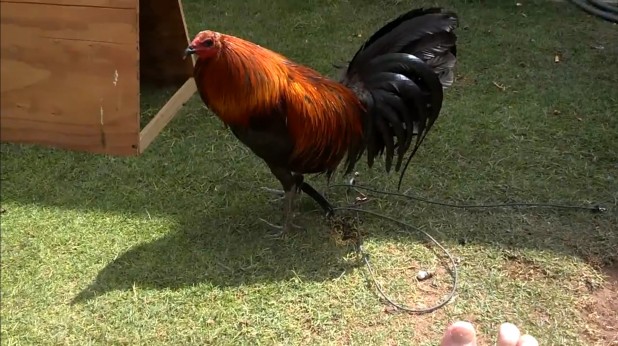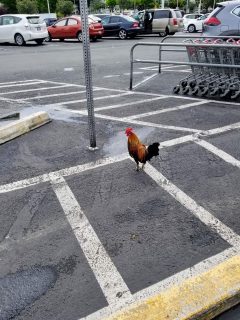
HONOLULU (Eagle News) — Two nonprofit organizations, Animal Wellness Action (AWA) and Animal Wellness Foundation (AWF) filed a request on Tuesday, September 1, to the U.S. Attorney’s Office, District of Hawaii, to investigate state residents allegedly involved in illegal trafficking of fighting animals, possibly generating millions of dollars as a result.
“Hawaii is at the center of the cockfighting trade in the Pacific Rim, with the state acting as a hub-and-spoke model for animal fighting activities in Asia, in the Pacific islands, and in the United States,” said Wayne Pacelle, AWA founder. “Hawaii cockfighters are breeding fighting animals to be hacked up in fighting pits within the state and throughout the world.”
Through public records requests to Guam’s Department of Agriculture, AWF and AWA obtained nearly 2,500 pages of avian shipping records dated between November 2017 and September 2019. These records detail approximately 750 shipments of birds by 71 individuals from more than a dozen states to Guam, where more than 130 individuals purchased the birds for fights in the said U.S. territory.
The records revealed that Hawaii had more shippers of fighting birds to Guam than any other state.
According to sources in Guam, AWA and AWF learned that the shippers use the U.S. Postal Service (USPS) to transport the birds, packing them into boxes and sending them in the cargo holds without food or water. Shipments to Guam are just indicators of a far more brisk trade in U.S.-produced fighting birds to other foreign jurisdictions, including the Philippines, Vietnam and other nations where the activity is not uncommon.
A detailed report covering the investigative findings points to apparent illegal animal fighting activities by a range of individuals immersed in animal trafficking. Below is just a sample, along with their background and testimonials:
- Richard Torres, of Triple T Gamefarm, uses the USPS to ship birds for fighting purposes. “If your chickens don’t win [at fighting derbies],” he notes, “nobody going to buy em.” Asked what he likes about roosters, he said the following: “Just the beauty, their courage, the way they, you know, no matter what they’ll continue fighting even if they’re chopped up, you know, chopped up to pieces and they just keep coming, you know, determination.” Torres adds, “The thing that gives me the most pride is when my customers call and they tell me that they won a derby.”
- Sid Etrata shares pictures on his Facebook page of his participation in cockfighting in the Philippines and in Guam. Of his fight in the Philippines, he noted, “I’m very fortunate to say that I’m with Gerry Ramos fighting under ‘Hawaiian Sid’.”
- John Cambra is long-time participant in the Slasher World Cup in the Philippines, including as recently as January 2020. He has had previous federal indictments for illegal cockfighting.
- Bryson Au, of Red Raiders Gamefarm, said in a 2018 broadcast interview with the Philippines-based BNTV that he “spars every day” and was in “five derbies this year so far.” When asked if he has a job, he says, “Not right now…because I’m winning.”
- Gino Joseph of Oahu says in his BNTV interview, “There’s a lot of people here that are really good rooster men. What holds us down is the fact that we not supposed to be doing it here.”
- Vernon Lowry, in his BNTV interview, describes his birds as, “high flying good cutting roosters” and “very good for long knife.”

“Hawaii has one of the nation’s weakest anti-cockfighting laws, and the presence of that anemic law has given false comfort to the people involved in the industry,” noted Margery Bronster, a former Hawaii Attorney General. “The federal law, however, is as strong as it can be, and it’s my hope that the U.S. Attorney for the District of Hawaii takes a serious look into the evidence that’s been amassed in this investigation.”
Under current federal law, it is a crime to:
- knowingly sponsor or exhibit an animal in a fighting venture;
- knowingly attend an animal fighting venture, or knowingly cause an individual who has not attained the age of 16 to attend an animal fighting venture;
- knowingly buy, sell, possess, train, transport, deliver, or receive any animal for purposes of having the animal participate in an animal fighting venture;
- knowingly use a postal service or any “written, wire, radio televisions or other form of communications in, or using a facility of, interstate commerce,” with intent to advertise an animal for use in a fighting venture, or to advertise a knife, gaff, or other sharp instrument designed to be attached to the leg of a bird for use in an animal fighting venture, or to promote or in any other manner further an animal fighting venture except as performed outside the U.S.; and
- knowingly sell, buy, transport, or deliver in interstate or foreign commerce “a knife, a gaff, or any other sharp instrument” designed or intended to be attached to the leg of a bird for use in an animal fighting venture.
Penalties for each violation of any one of the above provisions include a maximum of five years in prison and a $250,000 fine for perpetrators, except for an adult attending an animal fighting venture. Penalties for an adult in attendance include a year in prison and a $5,000 fine.
AWA has provided aggregated information on illegal animal fighting activities on www.endcockfighting.org.

(With reports from EBC Hawaii Bureau, Eagle News Service)
